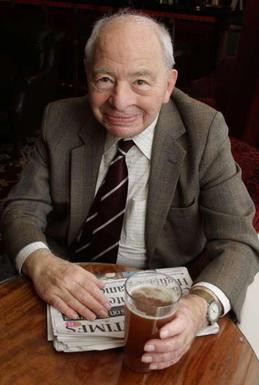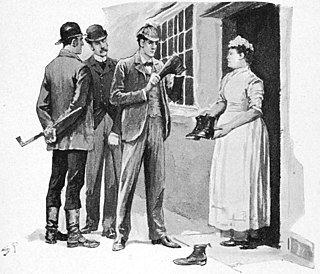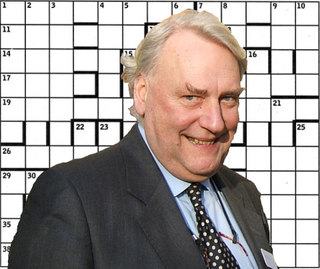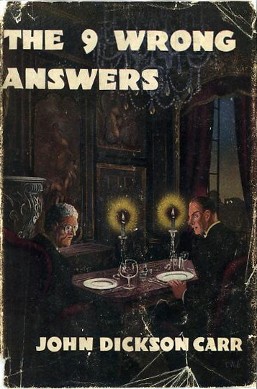
Norman Colin Dexter was an English crime writer known for his Inspector Morse series of novels, which were written between 1975 and 1999 and adapted as an ITV television series, Inspector Morse, from 1987 to 2000. His characters have spawned a sequel series, Lewis from 2006 to 2015, and a prequel series, Endeavour from 2012 to 2023.

Detective fiction is a subgenre of crime fiction and mystery fiction in which an investigator or a detective—whether professional, amateur or retired—investigates a crime, often murder. The detective genre began around the same time as speculative fiction and other genre fiction in the mid-nineteenth century and has remained extremely popular, particularly in novels. Some of the most famous heroes of detective fiction include C. Auguste Dupin, Sherlock Holmes, and Hercule Poirot. Juvenile stories featuring The Hardy Boys, Nancy Drew, and The Boxcar Children have also remained in print for several decades.

Laurence Sterne was an Irish novelist and Anglican cleric who wrote the novels The Life and Opinions of Tristram Shandy, Gentleman and A Sentimental Journey Through France and Italy, published sermons and memoirs, and indulged in local politics. He grew up in a military family, travelling mainly in Ireland but briefly in England. An uncle paid for Sterne to attend Hipperholme Grammar School in the West Riding of Yorkshire, as Sterne's father was ordered to Jamaica, where he died of malaria some years later. He attended Jesus College, Cambridge on a sizarship, gaining bachelor's and master's degrees. While Vicar of Sutton-on-the-Forest, Yorkshire, he married Elizabeth Lumley in 1741. His ecclesiastical satire A Political Romance infuriated the church and was burnt.

A cryptic crossword is a crossword puzzle in which each clue is a word puzzle. Cryptic crosswords are particularly popular in the United Kingdom, where they originated, as well as Ireland, Israel, the Netherlands, and in several Commonwealth nations, including Australia, Canada, India, Kenya, Malta, New Zealand, and South Africa. Compilers of cryptic crosswords are commonly called "setters" in the UK and "constructors" in the US. Particularly in the UK, a distinction may be made between cryptics and "quick" crosswords, and sometimes two sets of clues are given for a single puzzle grid.

A whodunit is a complex plot-driven variety of detective fiction in which the puzzle regarding who committed the crime is the main focus. The reader or viewer is provided with the clues to the case, from which the identity of the perpetrator may be deduced before the story provides the revelation itself at its climax. The investigation is usually conducted by an eccentric, amateur, or semi-professional detective.

Crime fiction, detective story, murder mystery, mystery novel, and police novel are terms used to describe narratives that centre on criminal acts and especially on the investigation, either by an amateur or a professional detective, of a crime, often a murder. It is usually distinguished from mainstream fiction and other genres such as historical fiction or science fiction, but the boundaries are indistinct. Crime fiction has several subgenres, including detective fiction, courtroom drama, hard-boiled fiction, and legal thrillers. Most crime drama focuses on crime investigation and does not feature the courtroom. Suspense and mystery are key elements that are nearly ubiquitous to the genre.
This article contains information about the literary events and publications of 1934.

The Life and Opinions of Tristram Shandy, Gentleman, also known as Tristram Shandy, is a novel by Laurence Sterne, inspired by Don Quixote. It was published in nine volumes, the first two appearing in 1759, and seven others following over the next seven years. It purports to be a biography of the eponymous character. Its style is marked by digression, double entendre, and graphic devices. The first edition was printed by Ann Ward on Coney Street, York.

Edward Powys Mathers was an English translator and poet, and also a pioneer of compiling advanced cryptic crosswords. Powys Mathers was born in Forest Hill, London, the son of Edward Peter Mathers, newspaper proprietor. He was educated at Loretto School and Trinity College, Oxford.
Games World of Puzzles is an American games and puzzle magazine. Originally the merger of two other puzzle magazines spun off from its parent publication Games magazine in the early 1990s, Games World of Puzzles was reunited with Games in October 2014.
Dr. Richard Austin Freeman was a British writer of detective stories, mostly featuring the medico-legal forensic investigator Dr. Thorndyke. He invented the inverted detective story. This invention has been described as Freeman's most notable contribution to detective fiction. Freeman used some of his early experiences as a colonial surgeon in his novels. Many of the Dr. Thorndyke stories involve genuine, but sometimes arcane, points of scientific knowledge, from areas such as tropical medicine, metallurgy and toxicology.

Joseph Smith Fletcher was an English journalist and author. He wrote more than 230 books on a wide variety of subjects, both fiction and non-fiction, and was one of the most prolific English writers of detective fiction.
The Clue series is a book series of 18 children's books published throughout the 1990s based on the board game Clue. The books are compilations of mini-mysteries that the reader must solve involving various crimes committed at the home of Reginald Boddy by six of his closest "friends".

Azed is a crossword which appears every Sunday in The Observer newspaper. Since it first appeared in March 1972, every puzzle has been composed by Jonathan Crowther who also judges the monthly clue-writing competition. The pseudonym Azed is a reversal of Deza, a Spanish inquisitor general. This combines the inquisitorial tradition of Torquemada and Ximenes with the wordplay element of a British cryptic crossword.

Banquets of the Black Widowers is a collection of mystery short stories by American writer Isaac Asimov featuring his fictional club of mystery solvers, the Black Widowers. It was first published in hardcover by Doubleday in September 1984, and in paperback by the Fawcett Crest imprint of Ballantine Books in June 1986. The first British edition was issued by Grafton in August 1986.

More Tales of the Black Widowers is a collection of mystery short stories by American author Isaac Asimov, featuring his fictional club of mystery solvers, the Black Widowers. It was first published in hardcover by Doubleday in October 1976, and in paperback by the Fawcett Crest imprint of Ballantine Books in November 1977. The first British edition was issued by Gollancz in April 1977.
Murder in Space is a 1985 science fiction murder mystery television movie set in the near future. The crew of an international space mission are on the return leg from Mars to Earth when an explosion occurs on the craft Conestoga, shortly after a series of murders starts. The crew of the returning craft are forbidden to return until the murderer is caught.

The Nine Wrong Answers, first published in 1952, is a detective story by John Dickson Carr which does not feature any of his series detectives. It is an expansion of Carr's 1942 radio play "Will You Make A Bet With Death".
John David Finnemore is a British comedy writer and actor. He wrote and performed in the radio series Cabin Pressure, John Finnemore's Souvenir Programme, and John Finnemore's Double Acts, and frequently features in other BBC Radio 4 comedy shows such as The Now Show. Finnemore has won more Comedy.co.uk awards than any other writer, and two of his shows appear in the top ten of the Radio Times' list of greatest ever radio comedies.
Cluedo, known as Clue in North America, is a murder mystery-themed multimedia franchise started in 1949 with the manufacture of the Cluedo board game. The franchise has since expanded to film, television game shows, book series, computer games, board game spinoffs, a comic, a play, a musical, jigsaws, card games, and other media.












